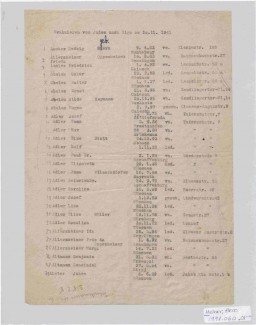
Media Essay
Browse an alphabetical list of curated media essays that explore various topics pertaining to the Holocaust and World War II. These essays give a brief overview of the topic and provide related media, including photographs, maps, oral histories, and films.
<< Previous | Displaying results 176-200 of 777 for "Media Essay" | Next >>
-

-
Drancy - Animated Maps/Maps
Media EssayThe Germans established the Drancy camp in France in August 1941. Drancy later became the major transit camp for the deportations of Jews from France. Fewer than 2,000 of the almost 65,000 Jews deported from the Dranc...
-
Drancy - ID Cards/Oral Histories
Media EssayThe Germans established the Drancy camp in France in August 1941. Drancy later became the major transit camp for the deportations of Jews from France. Fewer than 2,000 of the almost 65,000 Jews deported from the Dranc...
-
Drancy - Photographs
Media EssayThe Germans established the Drancy camp in France in August 1941. Drancy later became the major transit camp for the deportations of Jews from France. Fewer than 2,000 of the almost 65,000 Jews deported from the Drancy camp survived the Holocaust.
-
Rémy Dumoncel: Maps
Media EssayRemy Dumoncel was born to Catholic parents in Paris, France. In 1935, he became the mayor of Avon, a town southeast of Paris. Germany occupied Avon after defeating France in June 1940. Remy resolved to remain mayor. He became active in a resistanc...
-
Ebensee
Media EssayEbensee was a subcamp of the Mauthausen concentration camp. Its prisoners were used for forced labor during the construction of an underground rocket factory. Ebensee was liberated in May 1945.
-
Eichmann: Trial as National Catharsis - Photographs
Media EssayAfter World War II, Nazi war criminal Adolf Eichmann escaped US custody and fled to Argentina. He was caught by Israeli agents in 1960 and tried in Israel. For his pivotol role in the Holocaust, Eichmann was convicted and sentenced to death. Many historians credit coverage of the Eichmann trial with awakening public interest in the Holocaust.
-
Eichmann Trial: Photographs
Media EssayNazi war criminal Adolf Eichmann was caught by Israel agents in Argentina in 1960 and stood trial in Israel. For his pivotol role in the Holocaust, Eichmann was convicted and sentenced to death. The trial was widely televised and drew international attention to Nazi atrocities. Many historians credit coverage of the trial with awakening public interest in the Holocaust.
-
Einsatzgruppen (Abridged Article) - Photographs
Media EssayThe Einsatzgruppen (task forces or special action groups) were units of the Security Police and SD. They are sometimes referred to as "mobile killing squads." The Einsatzgruppen were a consistently brutal perpetrator of Nazi occupation policies. They are best known for their role in the massacres of Jews following the German attack on the Soviet Union.
-
Einsatzgruppen - Animated Map/Maps
Media EssayThe Einsatzgruppen (task forces or special action groups) were units of the Security Police and SD. They are sometimes referred to as "mobile killing squads." The Einsatzgruppen were a consistently brutal perpetrator of Nazi occupation policies. They are best known for their role in the massacres of Jews following the German attack on the Soviet Union.